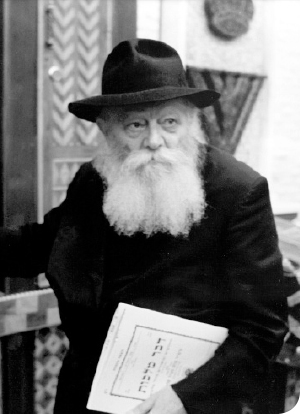TO BE THE ARMS AND LEGS OF THE REBBE
Chapter 16 of Rabbi Shloma Majeski’s Likkutei Mekoros, Volume 2, responds to the questions: Where does the Rebbe explain why he refers to the Pervious Rebbe when he actually means himself? Where does the Rebbe state that he and the Previous Rebbe are one and the same? (Underlined text is the compiler’s emphasis.)
Translated by Boruch Merkur
 9. There is something that should actually have been clarified long ago, but it was thought that the matter was self-understood. Nevertheless, since it is conceivable that it is not entirely obvious, it is necessary to articulate it clearly.
9. There is something that should actually have been clarified long ago, but it was thought that the matter was self-understood. Nevertheless, since it is conceivable that it is not entirely obvious, it is necessary to articulate it clearly.
The issue is connected with the occasion of this farbrengen [celebrating the 11th of Nissan, the Rebbe’s birthday].
Now, according to Torah – in particular in the areas of Musar and Chassidus – one of the middos (personality traits) that is rejected to the extreme is gaava (arrogance, haughtiness). Gaava is identified as the source and root of all unsavory middos, etc., to the extent that even an “eighth of an eighth (a tiny fraction of gaava)” is wholly negated. […]
In light of the above, the question and quandary is raised: How is there tolerance for a gathering to farbreng in connection with the honor of a man [to celebrate his birthday]?!
At first glance, in general, this is something that is utterly astonishing, and in particular, when connected with Chassidus, and especially when in a holy place – 1) a shul “that cultivates t’filla-prayer,” which entails being “like a servant before his master,” the ultimate state of bittul; and 2) a beis midrash “that cultivates Torah,” an essential condition of which is “may my soul be as dust before all, (and as a result) open my heart to Your Torah”! [If the farbrengen has connections with such a holy concept as bittul, how can it emphasize the celebration and honor of a man?]
Indeed, there is especial emphasis in shunning haughtiness in favor of bittul during the “month of redemption,” when there certainly must be the concept of redemption derived from all matters connected with the “Mitzrayim” (the unholy realm), whose source and root is “Amalek,” self-centeredness and haughtiness.
10. This matter, however, [was overlooked and not clarified, as it] is actually so simple that there is no room for someone to err in it:
This farbrengen is not connected with an “individual,” a specific person, or the like. It is connected, rather, with the entire group, with its Torah, and with the [Divine] will. Its purpose and intent is in continuance of the two hundred years of the Chabad Chassidic movement, as well as, prior to that, the movement of Chassidus in general. Thus, the affairs of the individuals who stand at the head of the movement are not (so) relevant; what is relevant is the state of the movement itself. In fact, the individuals, are [not glorified rulers; they are rather] “bearers of burden,” as the Gemara says: “Do you perceive that I am bestowing authority upon you; I give you servitude” (Horius 10a, end).
11. […] Serving G-d requires inclusiveness, “kulanu – all of us.” Moreover, it must be “kulanu k’echad – all of us as one.” That is, the avoda must annul the differentiation between “Your leaders of your tribes” and “the hewers of wood and drawers of waters,” to the extent that everyone together forms a single unit, “a great assembly” – in the singular (as above Section 2 ff.).
The importance of this unity – “kulanu k’echad” – is reflected in the fact that it draws down the blessings of the
Alm-ghty, as it is said, “Bless us, our Father, all of us as one, with the light of Your face” – first and foremost the blessing for success in the service of disseminating Torah and Judaism, to the point of “spreading the wellsprings outward.”
However, human nature (as established by the Alm-ghty) is such that each person identifies as a discreet, conscious being. Therefore, in order to attain this unity, the unity of “kulanu k’echad,” there must be [a leader] one individual, regarding whom it is said, “you will be a servant to this nation” (Melachim 1 12:7). This leader’s mission is to devote his talents towards engendering unity, as well as engaging others in Torah as given on Mount Sinai, for “all that an adept scholar is destined to innovate in Torah was said to Moshe at Mount Sinai.” How much more so does this apply to a scholar of the caliber of the N’siim of Torah and Chassidus – in particular, Chassidus Chabad, including my revered father in-law the Rebbe, nasi doreinu.
But since nasi doreinu, my revered father in-law, the Rebbe, is presently in the “world of truth,” he must have – even in the physical world – “legs” and “arms,” and all other limbs, devoted to the dissemination of his teachings, including their application in the realm of action. And in order to succeed in all this, it must be done methodically. Therefore, there is one of whom it is said, “I have made you a servant to this nation,” whose role is to organize these activities. It does not matter who this person is, etc. What is relevant is the function of continuing the activity and service of my revered father in-law, nasi doreinu!
(From the address of 11 Nissan 5745, Hisvaaduyos 5745, pg. 1692-1695, bilti muga)
 August 1, 2017
August 1, 2017
Reader Comments